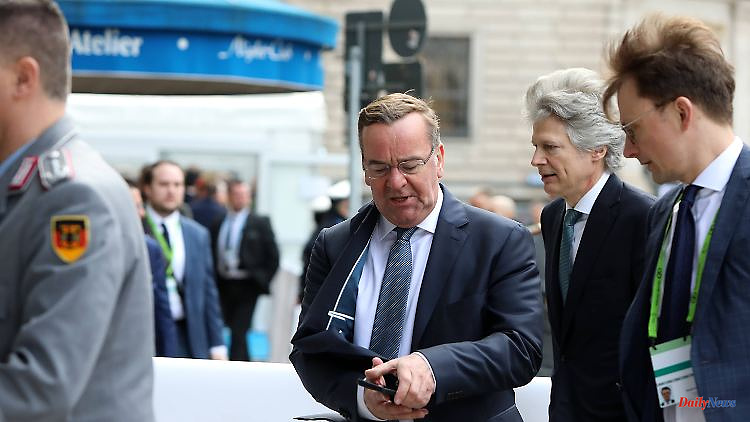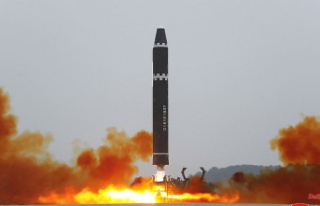At the security conference, the West had to show that it will stand by Ukraine's side and together in 2023. Other things went well - especially for Boris Pistorius. Five lessons from Munich.
1. The West has sent its signal
What Ukraine is doing right now requires almost supernatural powers. Stay confident and brave - despite the deaths at the front without gaining ground. Despite knowledge of torture, kidnapping and murder in the Russian-occupied territories. What task does a security conference in Europe have these days if not this: to send a powerful signal to Kiev and Moscow: We stand with Ukraine.
It doesn't matter which Western executive was at the lectern: Whether you heard the Munich premiere, delivered with verve and speed, by British Prime Minister Rishi Sunak, or the sober words of Chancellor Olaf Scholz. In terms of content, they were no less decisive. Whether President Emmanuel Macron, who made it clear to France that now was not the time for negotiations, or Kamala Harris.
The Vice President of the United States found the most powerful words to underline why giving up is not an option not only for Ukraine but also for her supporters. She evoked memories of pictures from Bucha that have burned themselves into many minds around the world. America will continue to lead in defense of human dignity, norms and freedom, Harris said. "There is too much at stake to do less than that."
Big words on the big panel - that's what it's meant for, and that's what the heads of state and government delivered. That has its value, especially in days when, for example, in Germany, a manifesto is circulating on the Internet that only feigns solidarity with Ukraine. In other democracies, too, there are discussions about the pros and cons of arms deliveries. That has to be the case. The leaders of the western world radiated their conviction, courage and cohesion - internally and externally.
2. Formulating war aims would be reassuring - but also risky
"Ukraine must win" - not only Boris Pistorius said that so clearly in Munich, this statement was made by many. But what would it mean to "win the war"? What would it mean to apply it to the areas under Russian occupation? And how far would the West support you on this path, which also harbors risks - especially when it comes to Crimea?
Questions that many people are asking themselves, and which were not answered so specifically at the security conference. "The West is not providing any help for recapturing Crimea" - a statement like this from Munich might make you feel more secure in the short term, but this security would be deceptive.
Because such a position would be based on strategy, not on legal issues. Under international law, Ukraine has the same claim to illegally occupied Crimea as to all other areas occupied by Russia. However, a strategic position that makes sense today may no longer fit the situation six months from now.
War is not a force of nature and not a process that, once set in motion, runs according to reliable rules. Those involved determine its dynamics, and to endure this uncertainty takes strength and has to be learned. The NATO Secretary General addressed this point very well on stage: "You don't get anything without risk," said Jens Stoltenberg, "but the biggest risk is that Putin wins."
And a second aspect speaks for the reluctance of the Western states in strategic questions: If Russia's dictator Vladimir Putin is to be made to doubt whether his own goals can be achieved and then to negotiate seriously, then he should be made to believe for as long as possible that Ukraine will have all means to prevent these goals.
If the West were to say publicly now: "We're out of Crimea, that's too sensitive for us," then that would be good news for Putin. He would incorporate them into his long-term strategy and feel stronger about himself. The big goal would seem closer to Putin, not further away. But why ever negotiate when victory is even closer?
That is why heads of state and diplomats would do well to ignore this question - although it is in the room - on the big podiums. Olaf Scholz said there that Ukraine was being helped "as extensively and as long as necessary". If you often want two more sentences from the chancellor, this statement was the right length. In smaller conference rooms, in a protected setting, there will have been room for strategic considerations.
3. It will be a difficult year with China
The fact that Beijing sent Wang Yi, its highest-ranking foreign politician, to Munich was a good sign. The Chinese did not come as a speaking machine, but confidently represented very concrete positions. First, Wang surprised by announcing a peace plan for the Ukraine war. Nothing can yet be said about the content of the plan that China intends to present on the anniversary of the start of the war.
Xi Jinping's influence on Putin is strong. Since China spoke out with the other nations at the G20 summit against Moscow's threats with nuclear weapons, Putin has noticeably disarmed. However, it is hardly to be expected that Beijing will now present a peace plan that Ukraine could consider fair.
All the less so since the United States suspects Xi of considering support for Russia "including arms", as US Secretary of State Anthony Blinken put it in an interview with the TV channel NBC. According to his own statements, he threatened the chief foreign policy officer from Beijing with "serious consequences for our relations" if this were to happen.
Wang Yi and Blinken had arranged to meet at short notice in Munich, to the relief of many observers. They wanted to take the opportunity to also talk about the spy balloon case. A Chinese balloon had flown in American airspace for days. Eventually Washington had him shot down and Blinken canceled a planned visit to China at short notice.
Wang Yi became sharp on stage as he voiced his assessment of the balloon launch. "Absurd and hysterical" was the reaction of the United States. The conversation between the two foreign politicians is said to have ended quite frostily later. But still, there was a conversation. That, too, is an important skill of the Munich Security Conference: creating a neutral space in which discussion partners can try to get closer, even in a conflict.
4. Boris Pistorius may conference
Many were excited about him: the new German defense minister had several appearances in the program and not only ensured approval with clear statements such as "Ukraine must win". He also looked for opportunities to set his own accents, for example when he spoke of Germany's willingness to achieve NATO's two percent target with the defense budget.
The statement as such was not surprising, and last week Pistorius, like other NATO colleagues, had spoken out in favor of two percent as the lower limit. But the minister made a personal commitment to it at a time when his defense budget doesn't yet have the funds to do so. If he cannot get the additional billions from the chancellor, then he will be seen internationally as not credible. With this promise, Pistorius showed more courage than it seemed at first glance.
In addition to the promise for the future, the minister in Munich also made German self-criticism, in which he called the two percent "overdue". Berlin has fallen well short of this goal of investing 2 percent of economic power in defense every year since NATO members committed to it in 2014. With the added "overdue" the minister signaled an awareness of this failure from the past few years.
For the taciturn chancellor, the lively Pistorius could become a helpful colleague in making German defense policy more binding and easier to understand. Or one who unintentionally steals the show? He was perceived by many in Munich as confident and personable. When asked whether he was optimistic about convincing coalition partners, the cabinet and his own party of the two percent target, the minister replied with a grin: "I am always optimistic - look at my face".
5. Half women - that feels good
The new head of the security conference, Christoph Heusgen, had set himself the goal: 50 percent women on the panels - not an easy task in the security industry, which has been male-dominated for many years. In the ranks of heads of state and government, on the other hand, it is easy to find what you are looking for - with Prime Minister Kaya Kallas from Estonia, with Finnish Prime Minister Sanna Marin or Moldova's President Maia Sandu. The proportion of women throughout the debate was good, and the representatives of Eastern Europe in particular opened up exciting perspectives.
The Munich Security Conference has easily achieved this goal, which should not be ambitious but actually should be standard, and thereby enriched itself. Good news from Sanna Marin: she assured the panel when asked that she had not stopped dancing even after her party visit last summer, which was scandalized by some.












